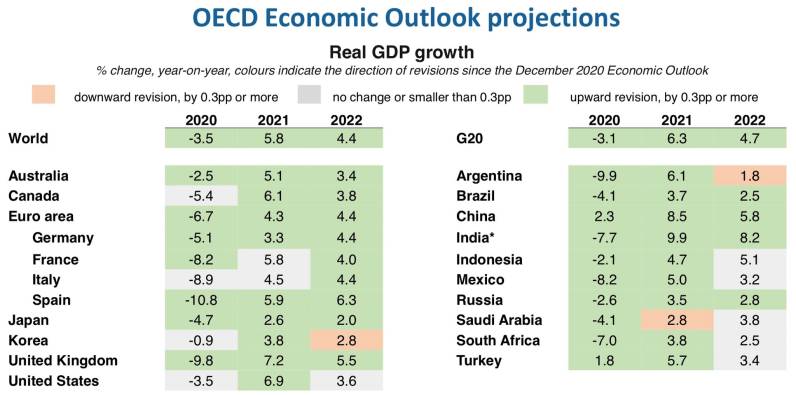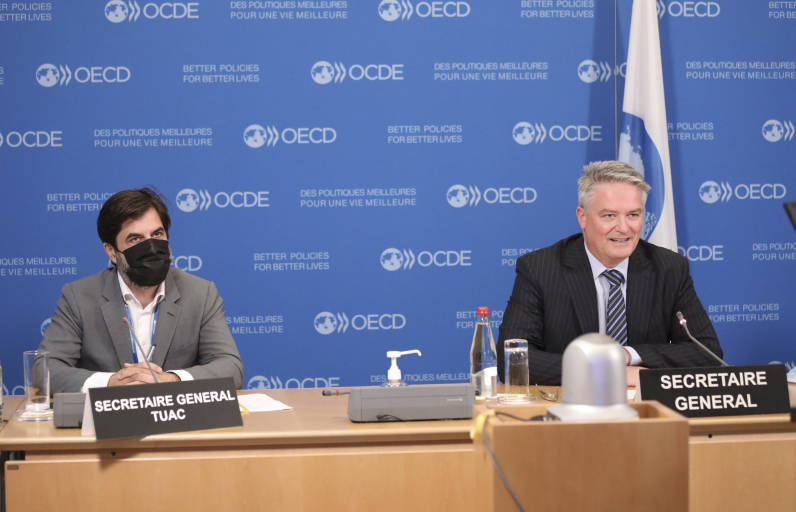OECD Ministerial Council Meeting Outcomes & TUAC Plenary Actions (ENG/FR)
02 June 2021
(Version française ci-dessous)
On the occasion of the OECD Ministerial held for the handover of leadership between Angel Gurria and Mathias Cormann as Secretary General and the release of the OECD Economic Outlook report on the Covid-19 crisis, the TUAC held its Plenary meeting to bring core trade union priorities at the centre of the OECD discussions.
OECD Ministerial Council Meeting 2021, 31 May- 1 June 2021
The OECD Ministerial Council Meeting met on 31 May – 1 June for the first of two gatherings this year. Like the following session in October, this meeting was chaired by the United States with Korea and Luxembourg as Vice Chairs. OECD Member Countries also welcomed Costa Rica as the 38th Member of the organisation.
The meeting was marked by the handover from Angel Gurría to the new OECD Secretary General Matthias Cormann. Secretary General Angel Gurría left the Organisation after 15 years. TUAC President Richard Trumka joined OECD members in thanking Gurria for his leadership and for turning the OECD’s focus towards working people and inclusive growth. He welcomed Mr. Cormann, the former Finance Minister of Australia, in his new role. In his introductory speech, Cormann committed to deliver on the value added of the Organisation, focus on the crisis and recovery based on market-based, competition driven approaches, pursue the climate and international taxation agenda, and enhance the outreach to the Asia Pacific.
OECD members, and both institutional partners TUAC and Business at OECD, joined discussions on responses to COVID-19 towards recovery under the theme “Shared Values: Building a Green and Inclusive Future”. The TUAC’s priorities are detailed in its official statement to the MCM. OECD members mostly agreed on the need for quick vaccinaton roll-out, the move to the twin green and digitial transitions – including by acknowledging the opportunities and challenges of the digital economy, the need for financing of long-term recovery through the international taxation efforts, fiscal reform and public as well as private investments – including in the health sector. Many raised issues around disadvantaged groups and inclusive growth, and insisted on rules-based multilateralism rooted in democratic values.
As concrete outcomes, the MCM released a statement and – amongst other:
- launched the OECD International Programme for Action on Climate
- adopted the Recommendation of the Council on Competitive Neutrality
- adopted the revised Recommendation of the Council on Children in the Digital Environment and welcomed the prior adoption by the Council of the revised Recommendation of the Council on Broadband Connectivity welcomed the OECD Initiative for Safe International Mobility During the COVID-19 Pandemic and welcomed the Blueprint Framework for Safer International Travel during the COVID-19 Pandemic as a voluntary tool
- welcomed the OECD Housing Policy Toolkit Synthesis Report
- welcomed the updated OECD Youth Action Plan and the proposal to develop an OECD Recommendation to promote government-wide strategies to support young people
- welcomed the Progress Report on the Development of an OECD Dashboard to Monitor a Strong, Resilient, Green and Inclusive Post-COVID-19 Recovery
- welcomed efforts to explore how Vocational Education and Training skills might be assessed across different systems.
The meeting also coincided with the release of the OECD Economic Outlook (see the detailed TUAC analysis here). The core message of the Outlook is that recovery will not be ordinary and it will be uneven. The Outlook shows that the global economy is expected to be $3 trillion better off than projected 6 months ago but still $3 trillion worse off than pre-COVID in late 2019. Only a few countries will reach pre-pandemic GDP levels by the end of this year, whilst others will only achieve that by 2025/2026.

TUAC Plenary, 28 May-2 June
The TUAC held its 146th Plenary on 28 May and 2 June. Presided by Richard Trumka (AFL-CIO, US), the Plenary confirmed the re-election of Marc Leemans (ACV-CSC, Belgium) as one of TUAC’s Vice Presidents. The Plenary also thanked Naoto Ohmi (RENGO, Japan) for his contributions as Vice President as he will retire from the position later this year. TUAC members adopted the TUAC MCM Statement and the Secretariat’s Activities Report as presented by General Secretary Pierre Habbard. The TUAC also adopted a resolution reflecting commenting on the dire situation in Colombia, condemning the violence against trade unionists and calling on Colombia to ensure the implementation of the OECD “post-accession monitoring framework”.
The new OECD Secretary General Matthias Cormann, on his second day in office, joined the plenary for a key note address. He stressed the importance of engaging with TUAC, referred to the OECD’s Jobs Strategy as a key instrument as well as the need for a sustained and green recovery. His intervention was rounded up by a forward-looking OECD panel with Deputy Secretary General Ulrik Vestergaard Knudsen and OECD Director Anthony Gooch (Public Affairs) and Deputy Director Mathilde Mesnard (Financial and Enterprise Affairs). They highlighted OECD ongoing outputs on the crisis – including its Covid-19 online hub to fight the infodemic, its activities on inclusive growth, spreading digital opportunities, enhancing the impact and effectiveness of responsible business conduct tools and the OECD/G20 corporate governance principles.
Given the imminent G7 Finance Ministers’ Meeting and Leaders’ Summit, as well as the G20 Labour and Employment Ministerial in a few weeks and the important G20 Finance Ministers’ discussions on international tax reform in July, the TUAC also brought together G20 and G7 representatives from Italy and the UK, the OECD G20/G7 Sherpa and L20/L7 representatives to exchange views and information.

©OECD, photographer Andrew Wheeler
FR
À l’occasion de la réunion ministérielle de l’OCDE pour la passation de pouvoir entre Angel Gurria et Mathias Cormann au poste de Secrétaire général et la publication des Perspectives économiques de l’OCDE sur la crise Covid-19, le TUAC a tenu sa réunion plénière afin de placer les principales priorités syndicales au centre des discussions de l’OCDE.
Réunion du Conseil de l’OCDE au niveau ministériel 2021, 31 mai- 1 juin 2021
Le Conseil de l’OCDE au niveau ministériel s’est réuni les 31 mai et 1er juin et sera suivie d’une seconde réunion en octobre. Cette ministérielle est présidée par les États-Unis, avec la Corée et le Luxembourg comme vice-présidences. Les pays membres de l’OCDE ont également accueilli le Costa Rica en tant que 38ème membre de l’Organisation.
La réunion a été marquée par le passage de témoin entre Angel Gurría et le nouveau Secrétaire général de l’OCDE, Matthias Cormann. Le Secrétaire général Angel Gurría a quitté l’Organisation après 15 ans. Le président du TUAC, Richard Trumka, s’est joint aux membres de l’OCDE pour remercier M. Gurria pour son leadership et pour avoir tourné l’attention de l’OCDE vers les travailleurs et la croissance inclusive. Il a souhaité la bienvenue à M. Cormann, l’ancien ministre des Finances de l’Australie, dans son nouveau rôle. Dans son discours d’introduction, M. Cormann s’est engagé à concrétiser la valeur ajoutée de l’Organisation, à se concentrer sur la crise et la reprise en s’appuyant sur les principes de l’économie de marché et la concurrence, à poursuivre le programme sur le climat et la fiscalité internationale et à renforcer l’ouverture vers l’Asie-Pacifique.
Les membres de l’OCDE, ainsi que les partenaires institutionnels TUAC et Business at OECD, se sont joints aux discussions sur les réponses à apporter à COVID-19 en vue de la reprise, sous le thème “Valeurs partagées : Construire un avenir vert et inclusif“. Les priorités du TUAC sont détaillées dans sa déclaration officielle à la Ministérielle. Les membres de l’OCDE ont dans l’ensemble convenu de la nécessité d’un déploiement rapide des vaccins, d’un passage à la double transition verte et numérique – notamment en reconnaissant les opportunités et les défis de l’économie numérique, sur la nécessité de financer la reprise à long terme par le biais des efforts de taxation internationale, de la réforme fiscale et des investissements publics et privés. Nombreux sont ceux qui ont soulevé les questions relatives aux groupes défavorisés et à la croissance inclusive et qui ont insisté sur un multilatéralisme fondé sur des règles et ancré dans les valeurs démocratiques.
Comme résultats concrets, la Ministérielle a publié une déclaration qui, entre autres :
- lance le Programme international d’action sur le climat de l’OCDE ;
- adopte une Recommandation sur la neutralité concurrentielle ;
- adopte une Recommandation révisée sur les enfants dans l’environnement numérique et une Recommandation révisée sur la connectivité à large bande ;
- soutient l’Initiative de l’OCDE pour une mobilité internationale sûre durant la pandémie de COVID-19 et son Plan-cadre pour les déplacements internationaux ;
- note le rapport de synthèse de l’OCDE sur le logement ;
- note le Plan d’action révisé de l’OCDE pour la jeunesse et la proposition d’élaborer une nouvelle recommandation de l’OCDE visant à promouvoir des stratégies gouvernementales de soutien à la jeunesse ;
- note le rapport d’étape sur l’élaboration d’un tableau de bord de l’OCDE pour suivre une reprise forte, résiliente, verte et inclusive ;
- note les efforts déployés pour étudier comment les compétences en matière d’enseignement et de formation professionnels pourraient être évaluées dans différents systèmes.
La réunion a également coïncidé avec la publication des Perspectives économiques de l’OCDE (voir l’analyse détaillée du TUAC ici). Le message central des Perspectives est que la reprise ne sera pas ordinaire et qu’elle sera inégale. Seuls quelques pays atteindront les niveaux de PIB pré-pandémique d’ici la fin de l’année, tandis que d’autres n’y parviendront qu’en 2025/2026.
Plénière du TUAC, 28 mai-2 juin
Le TUAC a tenu sa 146e séance plénière les 28 mai et 2 juin. Présidée par Richard Trumka (AFL-CIO, États-Unis), la plénière a confirmé la réélection de Marc Leemans (ACV-CSC, Belgique) comme l’un des vice-présidents du TUAC. L’assemblée plénière a également remercié Naoto Ohmi (RENGO, Japon) pour sa contribution en tant que vice-président, alors qu’il se retirera de ce poste plus tard cette année. Les membres du TUAC ont adopté la déclaration du TUAC pour la Ministérielle de l’OCDE et le rapport d’activités du Secrétariat, tels que présentés par le Secrétaire général Pierre Habbard. Le TUAC a également adopté une résolution commentant la situation désastreuse en Colombie, condamnant la violence contre les syndicalistes et appelant la Colombie à assurer la mise en œuvre du « cadre de suivi post-adhésion » de l’OCDE.
Le nouveau Secrétaire général de l’OCDE, Matthias Cormann, au deuxième jour de son entrée en fonction, s’est joint à la plénière pour une allocution principale. Il a souligné l’importance du dialogue avec le TUAC, a fait référence à la Stratégie pour l’emploi de l’OCDE comme un instrument clé ainsi qu’à la nécessité d’une reprise durable et verte. Son intervention a été complétée par un panel de l’OCDE avec le Secrétaire général adjoint Ulrik Vestergaard Knudsen et le directeur de l’OCDE Anthony Gooch (Affaires publiques) et la directrice adjointe Mathilde Mesnard (Affaires financières et entreprises). Ils ont mis en avant les résultats de l’OCDE sur la crise – notamment son hub en ligne sur Covid-19, ses activités sur la croissance inclusive, la diffusion des opportunités numériques, le renforcement de l’impact et de l’efficacité des outils de conduite responsable des entreprises et les principes de gouvernement d’entreprise OCDE/G20.
Compte tenu de l’imminence de la réunion des ministres des finances et du sommet des dirigeants du G7, ainsi que de la réunion des ministres du travail et de l’emploi du G20 dans quelques semaines et des importantes discussions des ministres des finances du G20 sur la réforme de la fiscalité internationale en juillet, le TUAC a également réuni des représentants du G20 et du G7 d’Italie et du Royaume-Uni, le Sherpa G20/G7 de l’OCDE et des représentants du L20/L7 pour échanger des points de vue et des informations.
Photos ©OCDE, photographe Andrew Wheeler
Photo ©OECD, photographer Andrew Wheeler
